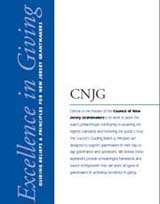Site Search
- resource provided by the Forum Network Knowledgebase.
Search Tip: Search with " " to find exact matches.
Excellence in Giving
In 2005, CNJG adopted Guiding Beliefs & Principles to offer a thoughtful source of direction and inspiration to help guide our state’s philanthropic sector into the future. CNJG first launched its Excellence in Giving initiative in 2007 with the goal is to provide grantmakers the practical tools necessary to ensure best practice in their operations and grantmaking.
The first booklet, Guiding Beliefs & Principles for New Jersey Grantmakers includes a wealth of insights and tips related to board governance, legal compliance, grantee communications, fiscal responsibility, public disclosure, and many other key areas of foundation governance and operations. It contains wisdom provided by leaders of all types of giving organizations within the CNJG’s membership, and is intended to serve as a practical resource to assist New Jersey foundations in their grantmaking. CNJG’s board is in the process of updating these beliefs and principles in 2023/2024. For more information on the updating process, please contact Theresa Jacks.
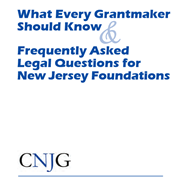 In 2010 CNJG released a second, comprehensive resource to help the state’s philanthropic community understand their ethical, legal, and fiduciary requirements and obligations - What Every Grantmaker Should Know and Frequently Asked Legal Questions. These two booklets are key publications in CNJG’s Excellence In Giving Series. While the Guiding Beliefs & Principles is available publically, members will need to log into access the legal guide for download.
In 2010 CNJG released a second, comprehensive resource to help the state’s philanthropic community understand their ethical, legal, and fiduciary requirements and obligations - What Every Grantmaker Should Know and Frequently Asked Legal Questions. These two booklets are key publications in CNJG’s Excellence In Giving Series. While the Guiding Beliefs & Principles is available publically, members will need to log into access the legal guide for download.
Members can request additional copies of the booklets mentioned on this page by contacting Theresa Jacks.
In the third session of Putting Racism on the Table (2016), Julie Nelson, Director of the Government Alliance on Race & Equity, Haas Institute for a Fair and Inclusive Society, focused on implicit bias. We encourage check out the viewing guide and discussion guide to be used with the video.
Watch the video
The Disaster Philanthropy Playbook, a comprehensive resource of best practices and innovative approaches to guide the philanthropic community in responding to future disasters, is now available for use at www.disasterphilanthropy.org/disaster-philanthropy-playbook/.
Designed as a multimedia, interactive website, the Playbook will be an “evergreen” resource designed for continued updates and knowledge-building. Community planning, civic rebuilding, legal services, housing, addressing the needs of vulnerable populations, working with local, state and federal government, mitigation and preparedness are some of the common issues faced by communities post disaster that are covered in detail in the Playbook.
The Disaster Philanthropy Playbook is a joint project of the Center for Disaster Philanthropy and Council of New Jersey Grantmakers in association with the Forum of Regional Associations of Grantmakers.
A CNJG corporate member asked for help with the scenario in which a corporate policy of not supporting religious organizations in their grantmaking, causes problems helping during a disaster in an urban or rural area, when the program that is delivering the disaster relief is based within a church. They want to work with those programs (a church serves as the program’s fiscal sponsor) who support efforts for hunger, homelessness, substance abuse recovery, racial equity, etc. as long as they do not discriminate and do no limit it to their own congregations. The request for policy samples to work around this religious organization hurdle as long as there is no discrimination or funding the actual church’s worship, was compelled by CNJG staff and is listed here.
The PSEG Foundation has awarded more than $1 million to 301 community organizations, 39 of which are first-time recipients, the group announced this week.
The grants range from $500 to $21,000 for eligible 501(c)(3) organizations, many of which are supported by Public Service Electric & Gas and PSEG Long Island employee-volunteers year-round. The PSEG Foundation, a separate legal entity from Public Service Enterprise Group, is a 501(c)(3) organization.
The funding responds to a record number of applications for the annual Neighborhood Partners Program and nearly doubles the number of organizations awarded funding since 2020. Founded in 2014, the NPP provides grant funding for organizations based on demonstrated program effectiveness, depth and overall alignment with the PSEG Foundation’s strategic pillars: environmental sustainability, social justice and equity and economic empowerment.
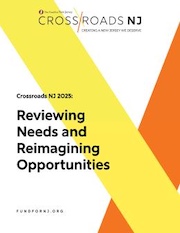
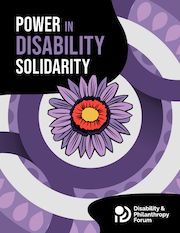
Five stories showcase disability solidarity in efforts from Black liberation, participatory grantmaking, art funding, community foundations, and much more. Collectively, each story demonstrates that when we unite as a community in solidarity, we can effectively dismantle ableism and advance all social justice movements.
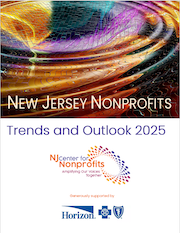
NJ Center for Nonprofits annual survey of the nonprofit community, shows that economic uncertainty, staffing shortages, tightening funding streams are among the top concerns nonprofits are navigating. New Jersey’s 41,000 charitable nonprofits are a major part of the economy, employing nearly 10% of the state’s private workforce.
How has place-based family philanthropy evolved over time? Rather than look first to comparing the contrasting decisions—why a place or issue basis for giving—this study is designed to examine how family foundations and funds committed to place are sustaining (or not sustaining) that commitment over generations.
Provident Bank has awarded $475,000 in funding to five nonprofit organizations as part of the New Jersey Department of Community Affairs’ Neighborhood Revitalization Tax Credit Program for Fiscal Year 2022.
The nonprofit organizations will use the funding to implement revitalization plans that address housing and economic development, provide opportunities for entrepreneurs to start businesses and job training for local residents, as well as complementary activities such as social services, recreation activities and open space improvements.
The New Jersey Department of Community Affairs served as the intermediary agency between the nonprofit organizations and Provident Bank.
The Healthcare Foundation of New Jersey (HFNJ) is pleased to announce that it has awarded $1,559,659 to thirteen New Jersey nonprofit organizations in its fourth quarter grant cycle of 2023. The total includes renewal funding for six projects that had previously been awarded grants from HFNJ, and first-time funding for seven new projects. In the fourth quarter there was a particular focus on strengthening youth mental health services. This brings the total commitment across HFNJ’s four quarterly grant cycles of 2023 to address mental health in the greater Newark community to $3,079,270.
The Healthcare Foundation of New Jersey (HFNJ) is pleased to announce that it has awarded $1,559,659 to thirteen New Jersey nonprofit organizations in its fourth quarter grant cycle of 2023.
The total includes renewal funding for six projects that had previously been awarded grants from HFNJ, and first-time funding for seven new projects. In the fourth quarter there was a particular focus on strengthening youth mental health services. This brings the total commitment across HFNJ’s four quarterly grant cycles of 2023 to address mental health in the greater Newark community to $3,079,270.


